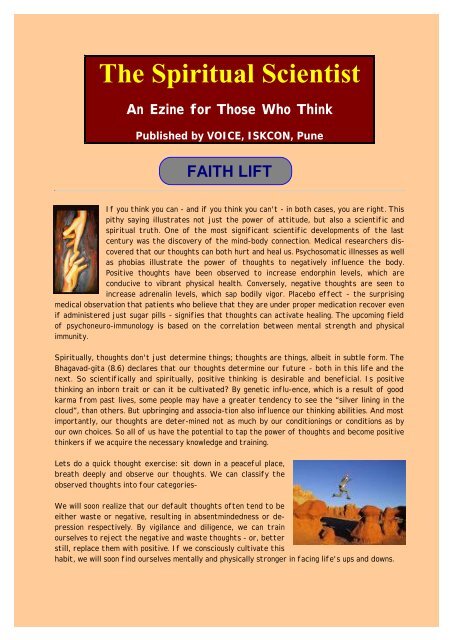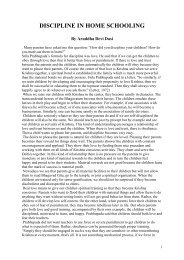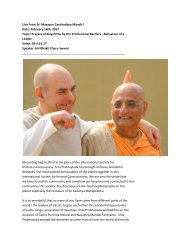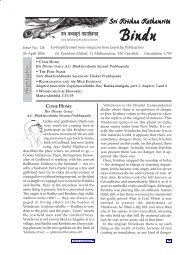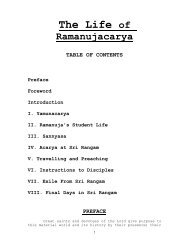The Spiritual Scientist - ebooks - ISKCON desire tree
The Spiritual Scientist - ebooks - ISKCON desire tree
The Spiritual Scientist - ebooks - ISKCON desire tree
You also want an ePaper? Increase the reach of your titles
YUMPU automatically turns print PDFs into web optimized ePapers that Google loves.
<strong>The</strong> <strong>Spiritual</strong> <strong>Scientist</strong><br />
An Ezine for Those Who Think<br />
Published by VOICE, <strong>ISKCON</strong>, Pune<br />
FAITH LIFT<br />
If you think you can - and if you think you can't - in both cases, you are right. This<br />
pithy saying illustrates not just the power of attitude, but also a scientific and<br />
spiritual truth. One of the most significant scientific developments of the last<br />
century was the discovery of the mind-body connection. Medical researchers discovered<br />
that our thoughts can both hurt and heal us. Psychosomatic illnesses as well<br />
as phobias illustrate the power of thoughts to negatively influence the body.<br />
Positive thoughts have been observed to increase endorphin levels, which are<br />
conducive to vibrant physical health. Conversely, negative thoughts are seen to<br />
increase adrenalin levels, which sap bodily vigor. Placebo effect - the surprising<br />
medical observation that patients who believe that they are under proper medication recover even<br />
if administered just sugar pills - signifies that thoughts can activate healing. <strong>The</strong> upcoming field<br />
of psychoneuro-immunology is based on the correlation between mental strength and physical<br />
immunity.<br />
<strong>Spiritual</strong>ly, thoughts don't just determine things; thoughts are things, albeit in subtle form. <strong>The</strong><br />
Bhagavad-gita (8.6) declares that our thoughts determine our future - both in this life and the<br />
next. So scientifically and spiritually, positive thinking is desirable and beneficial. Is positive<br />
thinking an inborn trait or can it be cultivated? By genetic influ-ence, which is a result of good<br />
karma from past lives, some people may have a greater tendency to see the “silver lining in the<br />
cloud”, than others. But upbringing and associa-tion also influence our thinking abilities. And most<br />
importantly, our thoughts are deter-mined not as much by our conditionings or conditions as by<br />
our own choices. So all of us have the potential to tap the power of thoughts and become positive<br />
thinkers if we acquire the necessary knowledge and training.<br />
Lets do a quick thought exercise: sit down in a peaceful place,<br />
breath deeply and observe our thoughts. We can classify the<br />
observed thoughts into four categories-<br />
We will soon realize that our default thoughts often tend to be<br />
either waste or negative, resulting in absentmindedness or depression<br />
respectively. By vigilance and diligence, we can train<br />
ourselves to reject the negative and waste thoughts - or, better<br />
still, replace them with positive. If we consciously cultivate this<br />
habit, we will soon find ourselves mentally and physically stronger in facing life's ups and downs.
<strong>Spiritual</strong> thinking enables us to further tap the power of thoughts by raising our life to a higher,<br />
more empowering dimension. Positive thinking is very difficult when confronted with ex-tremely<br />
negative circumstances such as shattering of cherished plans or outrageous behavior of others.<br />
<strong>Spiritual</strong> knowledge enables us to go far beyond positive perception of reality to perception of<br />
positive reality. As long as we are spiritually unin-formed, positive thinking alone will fall short in<br />
tackling the nega-tive realities of life. Nothing illustrates this often-overlooked limitation of<br />
positive thinking more than the greatest - and the most neglected - truth of life: death. If a<br />
loved one passes away, will positive thinking bring back that person? If someone is afflicted by a<br />
terminal disease, will positive thinking save that person from imminent death?<br />
<strong>Spiritual</strong> positive thinking enables us to understand and harmonize with the spiritual positive<br />
purpose of our existence. We are all souls, spiritual beings, beloved children of God and are<br />
entitled to rejoice in eternal loving exchanges with Him. <strong>The</strong> truly positive purpose of our present<br />
human lives is to awaken our dormant love for God, experience His unlimited love for us and<br />
ultimately returning back to His everlasting abode of ever-increasing bliss. <strong>Spiritual</strong><br />
enlightenment blesses us with the vision to see all events in our life as expression of God's love<br />
for us. <strong>Spiritual</strong> empowerment enables us to choose our actions so that they become expressions<br />
of our love for Him. No wonder Jesus declared loving God wholeheartedly as the most important<br />
commandment. <strong>The</strong> very word Islam refers to loving surrender to God. <strong>The</strong> Bhagavad-gita<br />
unequivocally declares constant devotional meditation on God, Krishna, as the pinnacle in the<br />
evolution of human thinking. We can most easily and effectively experience God's love for us and<br />
express our love for Him by chanting His bona fide Holy Names like Jehovah, Allah and Krishna.<br />
God being omnipotent fully manifests Himself in His Names and gives us the strength to reject<br />
negative and waste thoughts and fills our mind with positive spiritual thoughts. Thus spiritual<br />
positive thinking enables us to live positively by harnessing our latent positive spiritual energy.<br />
And at the time of death, it will enable us to leave positively by opening the door to eternal life.<br />
Hence cultivating loving thoughts for loving God is the ultimate key for tapping the power of<br />
thoughts.


